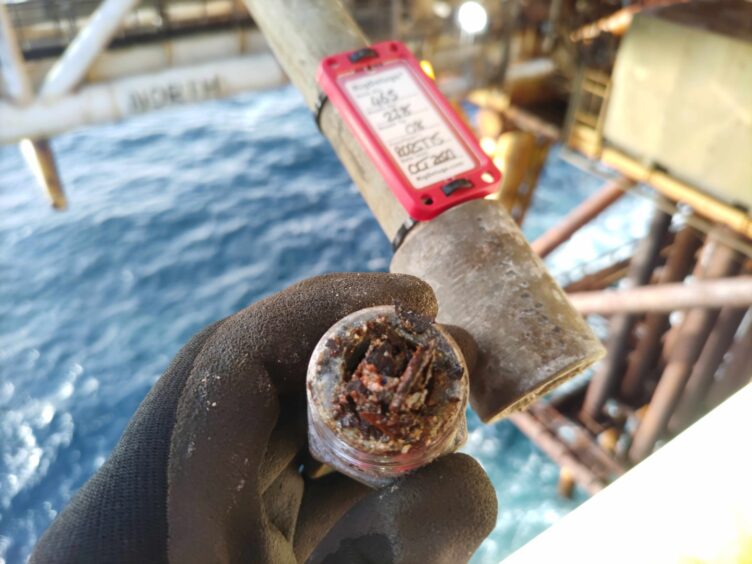
Industry figures have called for operators to stop using “fail fix” safety equipment test processes to check their offshore deluge systems over concerns it is putting North Sea oil and gas workers at risk of fire.
Ian Garden, managing director of Rig Deluge, has gone public over a range of issues he found when surveying North Sea rigs fire safety systems and has highlighted delays in addressing them.
Shocked by what he found on a site visit in October 2023, he recommended a series of actions be taken.
However, the Health and Safety Executive (HSE) and operator Repsol have confirmed they only took actions to address failure to meet performance standard requirements this year, with some work not due to be completed until November.
Speaking to Energy Voice in the inaugural episode of our In Conversation With series, Garden was joined by Piper Alpha survivor Joe Meanen to discuss their concerns about fire safety culture on the North Sea.
Rig visits
It started when Garden was approached by Talisman Energy, a previous owner of the Fulmar A platform, in 2014 owing to issues with its deluge systems failing their performance standards.
His teams found issues “around the failing of the systems on first-time activation,” he said, due to problems such as blocked delivery lines and nozzles.
At the time, Garden and his crew completed a dry survey of several systems on the Fulmar A platform, where they found that the system’s physical condition did not meet with how they were documented. They made recommendation on how to solve these issues but were removed from the project.
A decade later, in 2023, Fulmar’s new owner Repsol approached Rig Deluge to purchase and install the company’s products on the asset.
However, when they went out to Fulmar in October 2023, they found several issues with the deluge system they had encountered a decade earlier, which had prevented them from completing the job. This included heavy corrosion, failing and blocked delivery lines and broken nozzles.
This was in stark contrast to the paperwork for the system, which claimed that it was up to code.
“They had a system that had been passed at 95% compliant of their own performance standard,” Garden said.
“When we got out there and we walked the line, we checked the drawings and found that less than 50% of the system was operable… We once again identified at that point that they were operating with false compliance.”
Garden also visited Repsol’s Auk Platform and previously the Montrose platform, raising similar issues.
Reporting the problem
Having documented his findings, Garden raised his concerns first to Repsol in October 2023 and then to the HSE in January 2024.
“My complaint to the regulator was based around the paperwork not matching what was actually there,” Garden said.
He was due to send Rig Deluge staff out to the platform this January, but decided against it. “If I put anybody back out on the platform and something did happen, then I became complicit, so I refused to put my guys onto the asset on the 28th of December 2023.”
He approached Repsol to reiterate his concerns, but “it wasn’t until 17 January that they finally met with me,” he added.
Garden noted that he had also met with representatives from the HSE, who reassured him they were dealing with the situation.
“I highlighted my biggest concern was that nobody from the HSE had yet completed a physical inspection of any of the assets noted and the time,” he said.
“It’s almost a year since I found these issues – all Repsol assets should have had a physical offshore audit in-line with the HSE’s own guidance notes, and the issues noted should really all be mitigated by now.”
Taking action
HSE took regulatory action this year against Repsol for the Fulmar platform, including serving two Improvement Notices against it.
The first covers an investigation of Fulmar A that found the company imported gas to the platform between 7 February and 23 February 2024, despite three sections of the deluge network failing to meet performance standard requirements – specifically, less than 5% nozzle blockages from corrosion products and marine growth.
Garden, however, has said he disagreed with this note and believes six deluge systems were failed. Repsol has since made improvements in compliance with the notice.
Additionally, on 23 February Repsol shut down Fulmar A for ten days to perform a full wet test, flush and cleaning, due to HSE saying it had failed to meet performance standard requirements for the allowable number of nozzles blocked by corrosion and marine growth on three sections of the deluge system.
During the onshore HSE investigation, Repsol also shut down production on Auk and Clyde to investigate and assess the risks associated with the concerns raised.
This second improvement notice is due for compliance in November 2024.
HSE’s improvement notices required Repsol to address deficiencies in both their maintenance of deluge systems as well as how they carry out and implement the findings of risk assessments on impaired deluge systems.
HSE said Repsol had restarted production on its platforms after demonstrating that its deluge systems were operating within its performance standards.
“Installations of this nature present highly complex safety risks, requiring detailed actions,” an HSE spokesperson said.
“Some legitimate concerns were raised and we thoroughly investigated matters in relation to the performance of deluge systems.”
However, Garden alleged that HSE representatives have not physically visited the asset to see these systems operate in real time as of July 2024.
HSE added: “We have taken enforcement action where appropriate and we continue to work constructively with all concerned.”
Responding to a request for comment from Energy Voice, a Repsol UK spokesperson said: “HSE is satisfied with the actions taken by Repsol UK to comply with one of the two Fulmar Alpha Improvement Notices. We continue work to comply with the second notice and are regularly sharing progress with the HSE.
“Repsol continue to fully cooperate with all findings, investigations and any regulatory notices, and also acknowledge the advice given by Rig Deluge and has taken appropriate action.”
Repsol added that its “Tier 1 engineering contractor has addressed the areas of concern and continues to undertake assessment of the overall system performance across our assets”.
Garden welcomed confirmation that the company is taking action to resolve the problems but insists the “fail fix” process to achieve a level of compliance remains a major issue for the industry.
“Fair play to Repsol for initially making the move to install our products and mitigate the ‘fail fix’ problem on both the Fulmar and the Auk platforms, however at this point we believe they are still operating with false compliance.”
Abolishing fail fix
At the heart of Garden’s concerns about the fire safety systems on Repsol’s assets is the use of the fail fix process.
Oil and gas operators are allowed to self-test their deluge systems. If the system doesn’t pass, the operators can remove the nozzles, clean them, put them back and test again. If problems persist, the process can be repeated until it passes. In some instances, when they cannot pass at the original criteria, they can also lower the pass rate to achieve compliance.
HSE pointed to the fail fix system in its Ageing and Life Extension Key Programme (KP4) report, based on research carried out between 2011 and 2013.
Referred to in the report as the “fix on fault” process, HSE said it should be avoided “to ensure long-term risks are predicted and proactively managed”.
Meanen said: “Self-regulation, with the best intentions in the world, does not work. You need a new set of eyes, somebody with authority to come in and put their foot down and get things sorted.”
Garden warned that the fail fix process doesn’t provide either an adequate representation of how the system will work in a fire, nor does it address deeper maintenance issues with the system.
“If there had been a fire and the system had to operate, that system would have been less than 40% operable,” he warned about Fulmar’s deluge system. “Chances are that additional issues will happen when the system’s kicked off.
“For me, that is a big stumbling block for our industry. We don’t have to use the fail-fix process, but t’s an easy way to get around actually fixing the issue. It’s a fail with a temporary fix.”
Can it be fixed?
With the lack of adequate compliance standards at the heart of Garden’s concerns, he recommends abolishing the fail -fix method and self-standardisation.
“If the system doesn’t work first time, every time, then it’s failed,” he says. “Right now, the HSE will give you sometimes several months’ notice, if not a year’s notice, that they’re going to come out and do an inspection. Go back to the way that it used to be – they can come out and check any system, on any rig at any time. Those surprise visits would probably help.”
However, Garden believes the HSE is undermanned and facing strain on its resources and called for a “higher level” of safety governance where physical inspections that align with their own guidance notes be implemented immediately.
“That’s where we need investment in those resources, so that there can be more inspectors and they can do more spot visits.
“To miss something so dramatic and fully believe that everything’s safe, it shows that we do need a higher level of competency in somebody independent. We need something at a bit of a higher level to govern this.”
Meanen cautions against regressing into a piecemeal approach, adding: “On Piper Alpha, they had an inspection about two weeks before [the incident] from the department of energy, an inspector – they found no issues with Piper, even the permit to work system.
“Piper happened 36 years ago – we’re slipping back to what was happening.”
Recommended for you

